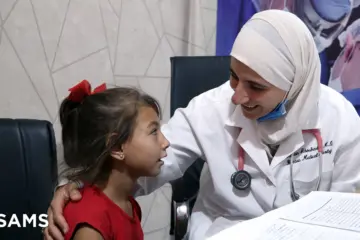May 4, 2021
Dr. Maher Azzouz, Chairman of SAMS Foundation
The ongoing COVID-19 pandemic has awoken the world to a newfound sense not only of vulnerability but also of shared humanity. It has brought us together in ways we couldn’t imagine, reinforcing our interconnectedness and interdependence.
Governments and non-profit organizations around the world are facing unprecedented challenges in responding to the public health and economic crises caused by the novel coronavirus pandemic. My organization, the Syrian American Medical Society (SAMS), provides healthcare services in Syria, which has been devastated by ten years of conflict. In that time, more than three in four healthcare workers have either left the country or been killed, and more than half of the health infrastructure has been destroyed. Shortages of doctors, equipment, and medical supplies, and lack of funds have been commonplace since the start of the conflict. Compounded by mass displacement and the rapid freefall of the Syrian pound, the economic impacts of the COVID-19 pandemic have plunged millions of Syrians into poverty. Yet in the past year, many countries around the world have come to face these same challenges. Suddenly, the pain felt by so many Syrian families struggling to feed their children, the shortages of healthcare workers, the despair in the face of trying to provide lifesaving healthcare against all odds, have been felt in every corner of the world.
Pope Francis wrote in an op-ed that “it is better to live a shorter life serving others than a longer one resisting that call.” Syria has produced countless heroes – doctors, nurses, teachers, clergy, civil defense- who have risked their lives to serve others. The pandemic has enabled the world to see these frontline workers as heroes like never before, each in our own countries.
The challenge now is for the rest of the world to follow in their footsteps and rise to the opportunity to serve others and show compassion.
We must learn from the international community’s failure in Syria- we can no longer allow ourselves to be victims of indifference.
As painful as the economic and human toll from the pandemic has been, it is also an opportunity. Not an opportunity to further insulate ourselves and pursue our own narrow self-interests, but an opportunity to care for one another as fellow human beings. It is an opportunity to overcome global indifference and to understand our interconnectedness. Syria is not alone in being in tremendous need – crises continue to worsen in Yemen, the Central African Republic, the Democratic Republic of the Congo, Venezuela, and beyond. The suffering of their populations has only been compounded by the pandemic.
We cannot afford to ignore the suffering of others- not today, not ever.
In the months and years ahead, the international community will need to address the distribution of vaccines – will wealthier countries work to ensure that there is equitable distribution? Likewise, will the international community come together in coordinated economic measures to rescue a severely damaged global economy, which has particularly affected developing countries?
The pandemic has also resulted in several global ceasefires – will these ceasefires become permanent, or will the drums of war return once the pandemic fades into the distance? And for everyday individuals, will we do our own small part by wearing masks, practicing social distancing, and receiving the vaccine at the earliest opportunity?
Now is a moment in time that beckons for solidarity and reconciliation- for compassion and a sense of shared humanity. Will we answer the call?



